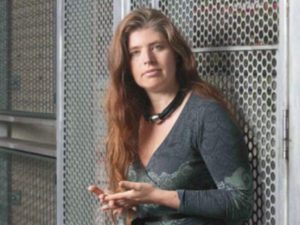Letter: The Prison COVID Crisis is Newsom’s to Solve
July 10 UPDATE: Gov. Gavin Newsom is set to announce that he will release approximately 8,000 people incarcerated inside California’s prison system, in a move that comes amid devastating coronavirus outbreaks at several facilities and pressure from lawmakers and advocates.
Also, the California Department of Corrections and Rehabilitation announced Thursday in a letter to inmates and a memo to staff that it will give “Positive Programming Credits” worth 12 weeks to most incarcerated statewide.

Professor Hadar Aviram
(July 7) Professor Hadar Aviram, one of the leading legal authorities on the California state prison system, has organized an open letter to Gov. Gavin Newsom asking that he use his executive power to release inmates facing the risk of COVID-19.
Published July 7 and signed by more than 450 criminal justice scholars, academics and advocates, the letter comes at a time when the virus is exploding in prisons across the state, due to overcrowding, lack of testing, and inter-prison transfers of infected inmates.
In April, a federal judge denied an emergency motion that would force California officials to develop a plan to further reduce the state’s inmate population by thousands in order to curb the spread of the coronavirus, saying the state has already implemented a myriad of changes. But since then, COVID-19 has run rampant through the prison system, infecting both inmates and staff. San Quentin alone has more than 1,500 confirmed cases.
Signatories include Sharon Dolovich, Professor of Law and Director of the UCLA Law Covid-19 Behind Bars Data Project; Keramet Reiter, Associate Professor, Criminology, Law & Society at UC Irvine; Marie Gottschalk, Professor at the University of Pennsylvania; Jonathan Simon, Professor of Law at UC Berkeley; Angela P. Harris, Professor Emerita, UC Davis School of Law; Franklin Zimring, Simon Professor of Law at UC Berkeley; and Prof. Ruth Wilson Gilmore, Professor at City University of New York (CUNY).
“We urge you to exercise all the powers at your disposal and release people from prisons to their communities — not just at San Quentin, but systemwide,” the letter states.
“A robust body of research in our field confirms that such releases, via executive orders, clemency, and parole (hundreds who have been found eligible for parole are still behind bars), will not endanger public safety. A quarter of the California prison population is aged 50 years and older; this population consists largely of people whose crimes of commitment were committed decades ago, and who do not pose any public risk, violent or otherwise.”
The letter points out that previous declines in the California prison population, through the Criminal Justice Realignment of 2011 and through Prop. 47 in 2014, did not put the public at risk. “We urge you to follow solid findings in criminology, public policy, criminal justice, and public health, rather than misleading and fear-mongering media reports.”
Aviram has been tracking the explosion of COVID-19 at San Quentin and elsewhere on her blog and in various other articles. Her latest post analyzes data that shows that outbreaks in prisons, such as San Quentin, for example, is related to the spike in cases in Marin County. The research shows that successfully controlling COVID-19 in the prison population is directly related to the health of the surrounding community.
“We appreciate and admire your willingness to courageously do the right thing in previous pivotal moments; your initiative on same-sex marriage and on the death penalty moratorium have shown your prescience and will be remembered kindly by history. This is precisely such a moment. We urge you to lead us in the right direction.”
Aviram will be speaking at a news conference at San Quentin on Thursday, July 9, at noon, along with Emeritus Professor Malcolm Feeley of Berkeley Law, author of The Process Is the Punishment and a signatory to the open letter. Joining them will be family members and loved ones of prisoners plus several formerly incarcerated individuals.
Read the full letter here. To listen to Professor Aviram discuss this issue on our Law and the Pandemic podcast, click here.